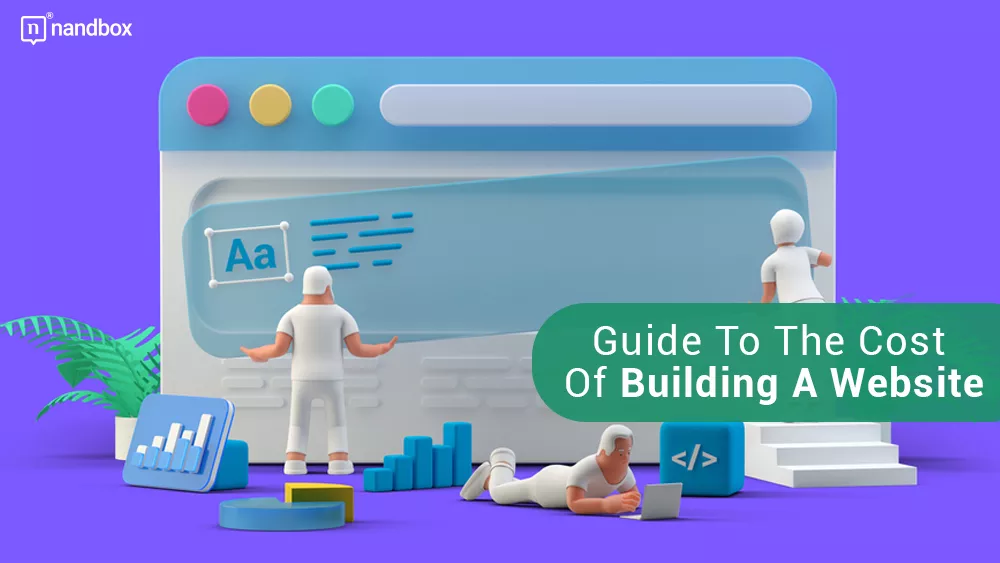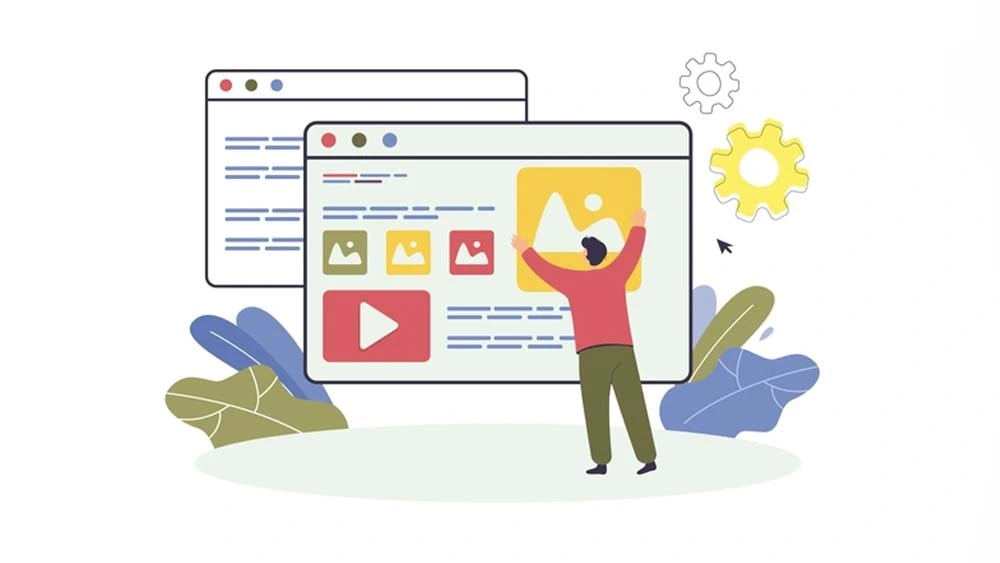A website is a great initial point if you want to take off with your business. It’s a way to put you out there and make people recognize your brand and be aware of it. However, the process of building a website is not as easy as you might think. It requires effort, time, and money (a good amount of it). It might not be very convenient, especially if you own a start-up or a small business. In this article, we’ll go through everything you need to know about how to build a website, from the process to the cost. Maybe we could have a solution for you to make it all easier.
How to Make a Website
Starting with the most frequently asked question, “How to create a website from scratch?” and people searching for “build website cost”. The answer may require an infinite number of articles because the process is not standardized for all websites; however, it varies from one website to the next, depending on the type of business and target audience. You have to first set your goal and understand your target audience’s preferences to be able to build not only a website that represents your brand but also a personalized experience. So briefly, we are going to walk through the typical steps everyone takes when building a website.
1. Set Up a Web Domain and Hosting
The first step in building a website is always choosing a domain name from the best domain registrars. While selecting a unique domain is crucial, coming up with the perfect name can be daunting. To effortlessly brainstorm name ideas for your domain, consider utilizing a domain name generator. These tools can inspire creative and relevant names by industry, keyword, or emotion, simplifying the initial step of digital branding. A domain name is a web address through which users will be able to access your website. Make sure, upon choosing your domain name, to choose a unique and easy one that users can easily find. You should also focus on selecting a domain extension that’s specific to your industry. For example, Name’s agency domains are perfect for insurance, talent, and advertising agencies.
The following step is web hosting. Think of web hosting as your website’s personal space on the world wide web, where you can store all your site’s data and files and make them accessible to people on the internet. It is imperative to choose a fast hosting provider as there are plenty of options available, like HyperHost to ensure your data’s safety
2. Build your Website’s Structure
There’s nothing more satisfying than an organized and well-structured website, which is why building your website’s structure is an essential step in your website-building journey. You have to define how things are going to take place and how many sections and pages your website should have. It should also be unique and easy to navigate through.
3. Choose a Design and Start Customizing
This step includes all steps regarding the website’s colors, the pictures you add, the text font, and the overall layout of the website; all of this would require great coding knowledge as it greatly depends on it. It is important for the website to be eye-catching and attractive to customers. So you have to go creative and represent your brand and business through colors and a good, neat layout. This doesn’t mean going entirely wild, but being able to create a consistent style. Keep in mind that your website will be accessed through multiple channels, whether PCs or mobile phones, so make sure that your website design will fit all. Make sure to leave a memorable first impression with your website design.
4. Add Content
After going through all the previous steps, you will be left with pretty much an empty website (content-wise). As a result, you should begin working on your website’s content and describing your company in simple, clear language that your target audience will understand. You also don’t need to overload your website with content. Keep it focused and try to correctly position your calls to action.
Build Website Cost: How Much Does it Cost to Build the Website?
Domain Name
A domain name’s price varies greatly according to many factors. The most common is a domain name registrar (the extension at the end of a web address, such as.com or.org). Each registrar has a different price per year. Domain names usually cost around $10–20 per year, and they could go higher if you went with a premium pre-registered one.
Web Hosting
Web hosting’s price varies according to the type of hosting you will need or go to. The three common web hosting types are
1. Shared Hosting
Shared hosting is self-explanatory in that you will share one server with other websites, and the number of websites is usually very large. Shared hosting would be suitable if you are aiming for little traffic for your website. It usually costs between $5-20 per month
2. Virtual private server (VPS)
A virtual private server is similar to shared hosting in that you share a server with other websites. However, a VPS or a Windows VPS Hosting of your choice, gives you much more space and control over your data, with the ability to manage your files and back up all your data, in addition to more features. VPS usually costs $20-100 per month
3. Dedicated Hosting
Dedicated hosting means having a private server all to yourself with no one to share it with. You have full control of your server, which is ideal if you are aiming for heavy traffic. It gives your website more power and makes it run faster and more smoothly, with high scalability. Dedicated hosting usually costs between $80 and $500 per month.
Website Design
The cost of your website design varies greatly according to the degree of complexity, meaning that a simple and minimal web design would cost much less than a complex and advanced one. That is why it could go as low as $2000 and as high as $15,000. In addition, location can also be a factor in pricing. For example, a Kansas City web design agency may offer lower rates compared to one located in New York.
Website Functionality
Website functionality accounts for a significant portion of the total cost of building a website. There is actually no maximum or minimum cost to determine, as it varies according to the functions you want to add to your website and their complexity. Also, whether they are plugins, extensions, or third-party integrations, they must be compatible. There are plenty of features to consider for your website, such as live chat, blogs, in-site search, events, etc. Each varies greatly in price. For instance, let us break down the cost of adding e-commerce functionalities.
E-commerce
Adding e-commerce functions is a bit complicated, as you are required to add functions such as payment gateways, shopping carts, and product pages to ensure that users can effectively buy products through your website and have a great shopping experience. This is why many businesses outsource such tasks to the best WordPress agencies to ensure seamless integration of e-commerce functionalities. It usually ranges between $2000 and $25,000, depending on the functions you add and the variety of your products.
Website Maintenance
Website maintenance must be considered in your budget if you intend to develop a scalable, stable, and well-managed website for your business. Website maintenance includes everything from keeping the website’s content up-to-date to optimizing its performance and speed. It is also vital as it ensures scanning through the website to ensure its safety and security and avoid any breaches or potential threats to protect both your data and your users’ data. The cost of website maintenance varies according to the website’s size and the number of functions included. It can reach as low as $400 and as high as $60,000 per year. These are averages of website build costs.
3 Alternatives to Building your Website at a Much Less Cost
Man has made it to Mars and the Moon, so anything else is pretty much doable. So, here are three website builders you could use to develop your website with a much easier process that will save you both money and time.
Wix
Wix is a website builder designed to accommodate all sizes of businesses, including small, medium, and large ones. It features more than 800 top-notch templates for all kinds of businesses. It is based on a drag-and-drop builder that is interactive and ideal for beginners. However, Wix’s websites are not mobile-friendly, and you would need to make great editing changes to make them mobile-friendly. It has a booking function and subscriber-exclusive content. It offers integration with the most widely used e-commerce platforms. Wix offers a variety of options at affordable pricing, making it excellent if you are just starting off.
Squarespace
Currently, Squarespace is among the most widely used website builders available. Furthermore, it’s regarded as one of the top website builders for small businesses. Squarespace provides more than 100 elegantly designed templates that can make you look outstanding and qualified. The templates are also responsive to mobile devices to avoid the trouble of having two distinct designs. You don’t need to be an expert to use Squarespace because it is user-friendly and adaptable. Squarespace stands out in the industry thanks to its integrated e-commerce feature, which lets you build your own store without the need for third-party integrations. It is ideal for you if you’re thinking about building a blog website. It also provides a variety of reasonably priced plans for everyone.
GoDaddy
GoDaddy is primarily recognized as the most widely used domain registrar and web hosting service ever. For beginners and small businesses, it also features a great website builder. The GoDaddy AI will suggest the ideal website layout once you have entered your business type and brand name.
A broad selection of templates is available. The website is designed to be compatible with Desktop-as-a-Service, making it accessible for viewing on both desktop and mobile phones, courtesy of GoDaddy. Because the website builder automatically saves all progress, you need not worry about your website’s editing progress. It also has a great blogging function with numerous features, such as the ability to accept comments.
GoDaddy offers a free plan with lots of features but some limitations. and four additional premium options with affordable costs and 24/7 customer support.
Canva
Canva is a web-based graphic design platform that offers a user-friendly website builder. With Canva’s website builder, users can create professional-looking websites quickly and easily without the need for any coding skills. Users can choose from various customizable templates, add their own text, images, and videos, and easily publish their website with just a few clicks.
Canva’s website builder is also optimized for mobile devices, making it easy for users to create responsive websites that look great on any screen size. Overall, Canva’s website builder is an excellent tool for anyone who wants to create a beautiful, functional website without the hassle of coding.
There you have it: everything you need to know about building a website and build website cost. There are also great solutions you can turn to if you are still starting your journey and need budget-friendly website development.







